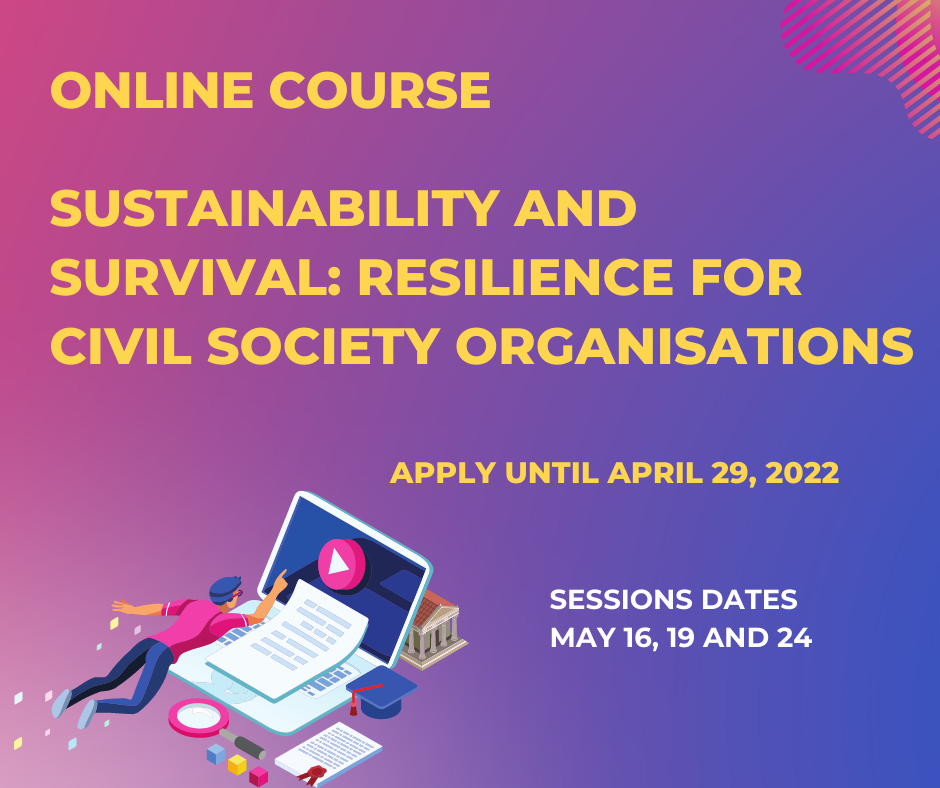
EHRA invites civil society and community organizations working with key population groups to apply for the online course: “Sustainability and Survival: Resilience for civil society organizations working with key populations in Central and Eastern Europe and Central Asia”.
This collaborative and interactive skills development course is specifically designed for non-profit, civil society and community-based organizations from countries of the CECCA region, that advocate and/or provide direct services for key populations. The course will help participants to acquire skills to build more diversified and sustainable funding model and confidence for organizational resilience. By the end of this course, participants are expected to be better equipped to the challenges of the current and future evolving political and funding environment.
Specifically, the course will support you in:
· Strengthening the effectiveness and resilience of your organization;
· Development of the strategy and plan for sustainability and piloting specific income generation approaches;
· Ensuring that your income generation streams and targets are aligned with organizational strategy, and respond to the current funding environment that you are facing;
· Comparing the characteristics of a range of new income sources and analyzing their potential fit for your organization (e.g. crowdfunding, social enterprise, membership models, social contracting);
· Facilitation of creative approaches to income generation with your colleagues.
The course offers the chance to join three 3-hour live and interactive online training workshops which will take place on May 16, 19 and 24, to view a series of webinars in your own time, and to undertake exercises to embed the learning between events. You will also have a mentor, who will be able to support you to practice and implement the learning, through a project of your choosing. Certificates will be issued to those that complete the course.
The course will be delivered in English and Russian language.
Authors of the course: Anna Sarang, Dermott McDonald, Rachel Haynes, and Victoria Ireland.
Trainers of the course: Maria Plotko (EHRA) and Anna Sarang
Course materials could be found HERE.
Who can apply? The programme is open to officially registered civil society / community-based organizations working with or for key communities (people who use drugs, women from KP groups, men who have sex with men, trans* people, young people from KP groups, LGBTQI+, sex workers) or people living with HIV, operating in one of 29 CEECA countries.
Participants must be staff members that have been involved in one or more income generation activities of the organization, able to commit to the course in May and speak and write in Russian or English.
If you would like to participate, please complete this online survey by April 29. We will be letting you know if you have a place by May 2, 2022.
PLEASE NOTE: Participation in the course is free. The number of seats is limited to 10 organizations, 2 people from each organization (program and financial). The selection of participants will be on competitive bases, based on the quality of completed applications. Filling out the online survey does not guarantee participation in the course. We will inform you about enrolment in the group by May 2, 2022.
The course is delivered in the framework of the Eurasian Regional Consortium project “Moving Together Towards Quality and Equality: Improved Sustainable Services for ISPs in EECA” financed by the Robert Carr civil society Networks Fund (RCF). The Eurasian Regional Consortium joins the efforts of Eurasian Coalition on Health, Rights, Gender and Sexual Diversity (ECOM), Eurasian Women’s AIDS Network (EWNA), Eurasian Harm Reduction Association (EHRA), Sex Workers’ Rights Advocacy Network (SWAN) and movement that unites teenagers from the region of Eastern Europe and Central Asia TEENERGIZER to effectively address the lack of financial sustainability in prevention, treatment, care and support programs for the key populations vulnerable in terms of their rights violation and the risk of HI
